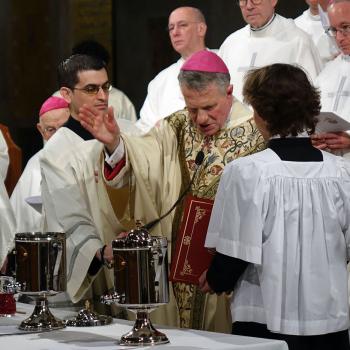Hitchens does not care what you believe as long as you keep it properly to yourself. When you hurl your beliefs into the public square—especially in "the world's first secular republic"—then he has to care. If the zealots enforce a regime of compulsory holiday cheer, or of sharia law, or of forced conversion or ethnic cleansing in the name of faith, then Christopher Hitchens has to care what they believe. He does not want to have to care.
The essence of the war over Christmas is the more basic disagreement over the proper expression of religion in the public square. Even if the founders in general never envisioned that the Constitution would be interpreted to mean that no nativity scenes could appear on state-owned premises, is this the actual implication of the establishment and free exercise clauses? Do nativity scenes on City Hall lawns, and Christmas trees in schools, and even the words "Merry Christmas" in government offices, amount to tax-supported endorsements of a particular religion?
Yet Hitchens prompts me to ask another question. In the war over Christmas, evangelicals have long insisted that the Constitution should not be understood to prohibit expressions of faith, much less the Christian faith that has nurtured this nation since its infancy, from tax-supported public spaces. What if we won that war? If there were a nativity scene in front of every City Hall, what would be the consequences?
Many evangelicals believe that the stories and ceremonies of Christian faith would have a leavening effect upon American culture, communicating a vision of the true and the good and the beautiful that is life-giving and that nurtures a society that is loving and just—and, ultimately, that gives witness to and draws more toward the Way, the Truth, and the Life. Perhaps, they believe, the reassertion of the truly Christian symbols of Christmas would sweep away the secular symbols—like Santa and the elves, the tree and the presents—that have made Christmas into a riot of rampant materialism. To win the war on Christmas, then, would be to re-secure the rights of towns and states and even the federal government to honor the story of Jesus' birth, and so to re-permeate American society with the specifically Christian symbols of Christmas.
I wonder, though, if such a win were possible in contemporary American society, how it would be received by those who are not Christian, and thus whether a win in the war over Christmas would lead to a loss in the struggle for souls.
To be clear, I do not believe that Christians should withdraw from the public square. Christians should never acquiesce to the pressure to make their faith merely private. Christian faith permeates every aspect of life, private and public alike. We are called to be imitators of Christ, not to be nice and accommodating and inoffensive. But our faith should be public in the right way, and we should choose our battles carefully. Some wins come at too high a cost in the larger battle for hearts and minds.
Perhaps Christians should focus on the spiritual meat of Christmas and cut away the fat. Perhaps the better witness would be for families such as mine to put into practice the meaning of the incarnation of God. Perhaps we should concentrate on being bearers of light and life into places of darkness and death, on bringing the good news of God in humble forms, on giving ourselves to live and to sacrifice and to die for our fellow men. Sometimes it is better to put off the fight for your own rights, in order to work for the blessing of those less fortunate.
My wife and I were already contemplating the Santa question. I am choosing not to perpetuate the Santa myth in my own family, not because I don't want my daughter to conclude that I will lie to her about invisible things (although that too is a concern), but because I wish that our society in the Christmas season would turn away from Santa and Macy's and, yes, tendentious legal battles that serve only to alienate non-believers, and would focus instead on the story of a magnificent Creator God who so loved the world that He sent his son to live and teach and sacrifice and suffer and die and rise again amongst us. And if I wish that our society would do these things, then I should begin the change in myself and in my family.
The Christopher Hitchenses of the world will not be swayed by legal battles or by forcing more nativity scenes into the environment in which they live. They will not interpret these things as love. Nor will they be swayed by Christians who devote more time to Santa and presents than to Jesus Christ and what his birth implies for the world. Whatever St. Nicholas once meant, he is now mostly a marketing tool, and more American households teach the Santa story (38 percent) than they tell the Christmas story from the Bible (28 percent) at Christmas. But which is more important? If I could choose whether those Christopher Hitchenses would see more nativity scenes in tax-supported spaces, or more Santa Clauses in store windows, or more Christians inspired by the birth of Christ to bring love and hope and good news to others, I would choose the latter in a heartbeat.
So, sorry sweetheart, no Santa for us. It is time to make a break with the way in which Christmas is presently celebrated and fought over. If we would form a better witness to the world, we should focus on the essence of Christmas, not its accessories, however jolly or round-bellied they might be.
You can charge me for the therapy for every other wrong decision I'm making. But you can blame the Death of Santa on old Hitch. Or thank him. As we forsake Santa and focus instead on reading—and living—the gospel story instead, our society will be the better for it.





